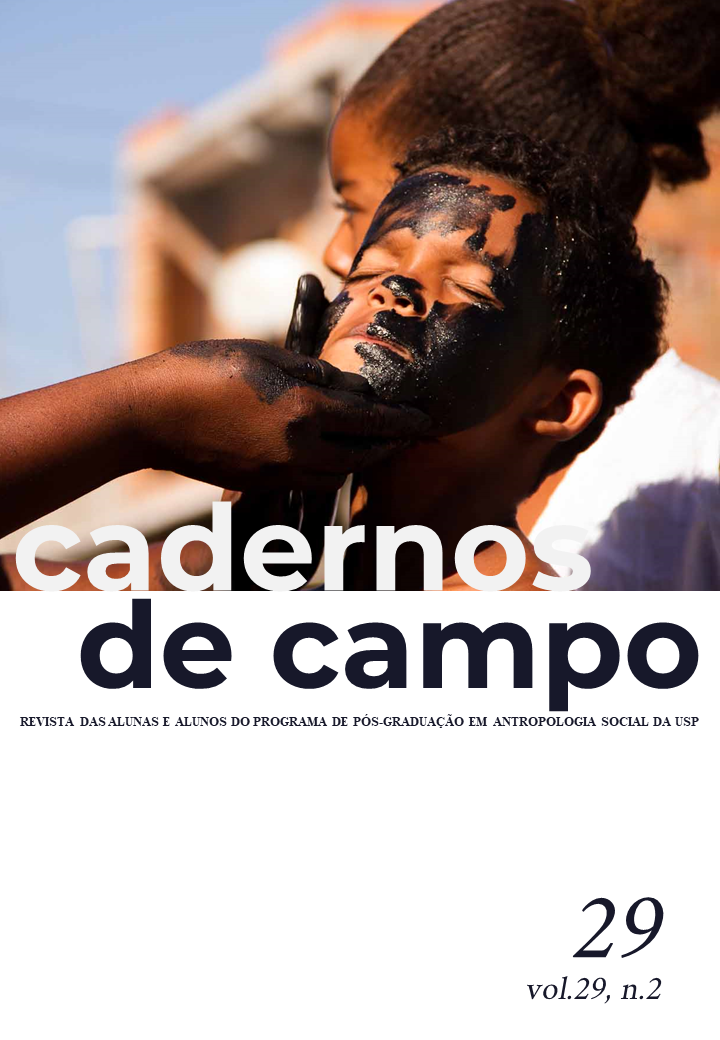Incipient anthropological strategies for a digital ethnography: a discussion based on media narratives about sexual and gender-based violence and hazing at a Faculty of Medicine
DOI:
https://doi.org/10.11606/issn.2316-9133.v29i2pe175324Keywords:
Media, Sexual violence, Hazing, Digital anthropologyAbstract
The article is based on a research developed between 2017 and 2018 seeking to understand how the current political dispute of meaning to the categories of sexual and gender violence, and hazing have been appropriate and represented by the Brazilian hegemonic media. It analyzes the construction of media narrative on gender and sexual violence in São Paulo colleges, mainly at the Faculty of Medicine. In 2014, this Faculty was party in a Parliamentary Commission of Inquiry, at the Assembleia Legislativa de São Paulo. The media repercussion of these cases promoted the public naming of certain practices such as rape, sexual abuse and violence, that until recently were not necessarily meant in this way. It discusses also the possible strategies for using digital as an anthropological research field and the construction of a digital archive as a database.
Downloads
References
BAYM, Nancy. (2010). Personal connections in the digital age. Cambridge: Polity.
BOURDIEU, Pierre. (1989). O poder simbólico. Lisboa, Difel.
BOURDIEU, Pierre. (1997). Sobre a televisão. Rio de Janeiro, Jorge Zahar.
CHAMPAGNE, Patrick. (1998). “A visão midiática” In: BOURDIEU, Pierre (org.). A miséria do mundo. 2ª ed. Petrópolis: Vozes.
COLEMAN, Gabriella. (2010). “Ethnographic Approaches to Digital Media”. Annual Review of Anthropology, vol.39, n.1, p.487-505.
COULDRY, Nick. (2003). “Beyond the hall of mirrors? Some theoretical reflections on the global contestation of media power” In: COULDRY, Nick; CURRAN, James. Contesting Media Power: alternative media in a networked world. Lanham: Rowman & Littlefield.
COULDRY, Nick; CURRAN, James. (2003). “The Paradox of Media Power” In: COULDRY, Nick; CURRAN, James. Contesting Media Power: Alternative Media in a Networked World. Lanham: Rowman & Littlefield.
CUNHA, Olívia Maria Gomes da. (2004). “Tempo imperfeito: uma etnografia do arquivo”. Mana, Rio de Janeiro, v. 10, n. 2, p. 287-322.
CURRAN, James; FENTON, Natalie; FREEDMAN, Des. (2012). Misunderstanding the internet. London: Routledge.
FABIAN, Johannes. (2008). Ethnography as Commentary. Writing from the Virtual Archive. Durham: Duke University Press.
GEERTZ, Clifford. (2015). A Interpretação das Culturas. Rio de Janeiro, Grupo Editorial Nacional.
HALL, Stuart. (2006). Da Diáspora: identidades e mediações culturais. Belo Horizonte, Editora da UFMG.
HINE, Christine. (2000). Virtual ethnography. California: Sage Publications Ltd.
HORST, Heather; MILLER, Daniel. (2012). “The digital and the human a prospectus for digital anthropology” In: HORST, Heather; MILLER, Daniel. (ed.). Digital anthropology. Berg: London
LANDINI, Tatiana Savoia. (2006). “Violência sexual contra crianças na mídia impressa: gênero e geração”. Cadernos Pagu, vol.26.
LOWENKRON, Laura, FERREIRA, Letícia. (2014). “Anthropological perspectives on documents: Ethnographic dialogues on the trail of police papers”. in: Vibrant – Virtual Brazilian Anthropology, v. 11, n. 2.
MAGNANI, José Guilherme. (2009). “Etnografia como prática e experiência” In Horizontes Antropológicos, v.15, n.32, p.129-156.
MARCUS, George. (1995). “Ethnography in/of the World System: The Emergence of Multi-sited Ethnography”. Annual Review of Anthropology, vol.24.
OLIVEIRA, Roberto Cardoso. (1998). “O trabalho do antropólogo: olhar, ouvir, escrever” In: O Trabalho do Antropólogo. São Paulo: Paralelo/Ed.Unesp, p. 17-35.
PARREIRAS, Carolina. (2015). Altporn, corpos, categorias, espaços e redes: um estudo etnográfico sobre pornografia online. Dissertação de Doutorado, IFCH, Universidade Estadual de Campinas.
PEIRANO, Mariza. (2014). “Etnografia não é método” In: Horizontes Antropológicos, Porto Alegre, ano 20, n. 42, p; 377-391.
RAMOS, Jair de Souza. (2012). “Toma que o aborto é teu: a politização do aborto em jornais e na web durante a campanha presidencial de 2010”. Revista Brasileira de Ciência Política, n.7, p. 55-82.
STRATHERN, Marilyn. (2006). O Gênero da Dádiva: problemas com mulheres e problemas com a sociedade na Melanésia. Campinas: Ed.Unicamp.
Downloads
Published
Issue
Section
License
Copyright (c) 2020 Cadernos de Campo (São Paulo, 1991)

This work is licensed under a Creative Commons Attribution-NonCommercial-ShareAlike 4.0 International License.
I authorize Cadernos de Campo Journal of Anthropology to publish the work of my authorship/responsibility, as well as I take responsibility for the use of images, if accepted for publication.
I agree with this statement as an absolute expression of truth. On my behalf and on behalf of eventual co-authors I also take full responsibility for the material presented.
I attest to the unpublished nature of the work submitted





